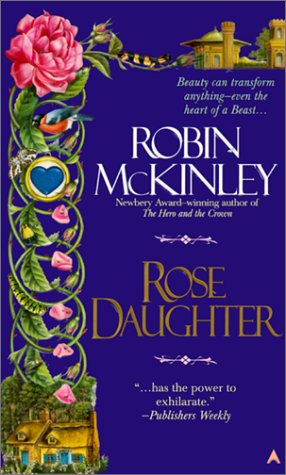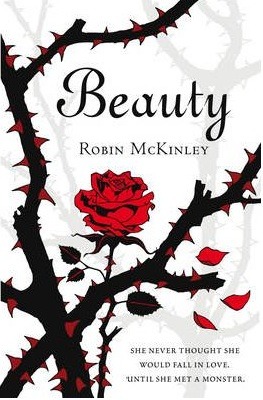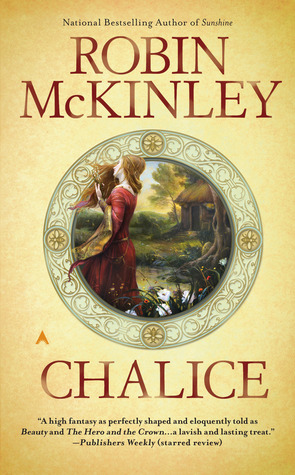I was thinking about the sort of content I can post here, and how to make sure there’s always some content going up at least once a week. I’ve pretty much decided that all reviews of ARCs will go up here, and any reviews of books I found particularly interesting. There’ll also be some giveaways, I’ll have my readathon progress posts here, and then there’ll be posts like this one: random topics related to books.
And what is this post about? Well, I was thinking today that I couldn’t actually pick my ten favourite books ever. But I could tell you the ten books/series I reread most. I am a rereader: it never actually occurred to me that was an odd thing until someone on Goodreads treated the idea with scorn. But while there’s so many books out there for me to get round to reading, there’s always more to find in the books I’ve already read — at least the good ones. So without further ado, and in no particular order because it already pains me to come up with a top ten in the first place…
(Well, okay, a bit extra ado — I’m adding links to reviews of these on Goodreads. If you have an account, I would super appreciate you clicking the like button there, if you do like them. It helps me get more ARCs, etc.)
#1 – The Lord of the Rings, J.R.R. Tolkien
As a kid, I loved The Hobbit, and agitated for the day when my mother would let me read LotR. When she finally did, I was hooked. I probably read it at least once a year ’til I was about sixteen, and then I sort of caught the general bug going round about the various things wrong with Tolkien and lost interest. For a while. It was Ursula Le Guin’s essays in The Wave in the Mind that got me thinking about Tolkien again, and rediscovering his work; it was my MA that really got me digging into it. And god, guys, there’s so much there. I can actually understand people who find it boring, people who are troubled by his (lack of) portrayals of women, of non-white people, etc. But the sheer scale of the world he created, the seriousness he treated it with, I can’t help but love. I’ve reread LotR twice this year, I think — and I’m partway through a third time.
Reviews (from when I read the three books in twenty-four hours!): The Fellowship of the Ring, The Two Towers, The Return of the King.
#2 – Tigana, Guy Gavriel Kay
Or probably just about anything by GGK. I actually usually have a problem getting into his books in the first place: his style takes some getting used to, for me, and some aspects of it annoy me (especially in his early novels). I love the world of Tigana, though, the characters and their intense feelings, the criticisms of colonialism that’re going on, and the way that he makes no promises of a happy ending. He walks a line of moral ambiguity quite well, allowing you to sympathise with both sides of the fight (at least in most cases; there is one unequivocal villain, but he isn’t really at the emotional heart of the story anyway).
Review.
#3 – The Dark is Rising Sequence, Susan Cooper
I suspect people who know me well are probably surprised this wasn’t the first one that came into my mind. I’m kind of surprised, too. I first experience The Dark is Rising through the BBC radio adaptation of the second book of the sequence — the cast was excellent, just perfect, and it gave me chills. I didn’t actually read the series until I was older, maybe about fifteen. And then I fell in love. It helps that the last two books are set in Wales. People who claim it’s morally black and white aren’t reading closely enough: there’s an absolutely lovely scene between John Rowlands and Will Stanton where they talk about that very issue, and conclude that while the Light and the Dark are like that, humanity is all shades in between.
The Arthurian elements help, too.
Reviews: Over Sea, Under Stone, The Dark is Rising, Greenwitch, The Grey King, Silver on the Tree.
#4 – Lord Peter Wimsey mysteries, Dorothy L. Sayers
Particularly Strong Poison and Gaudy Night, where Peter and Harriet first meet and where Harriet finally agrees to marry Peter, respectively. I have a huge soft spot for all forms of this: the books, the tv series, the radio adaptations… Edward Petherbridge and Ian Carmichael were both such perfect Peters in different ways. When I was in hospital recovering from having my gallbladder removed, and I was having serious panic attacks (my blood oxygenation % was in the low 80s, I believe), they wouldn’t let my mother stay with me, so she put a Peter Wimsey audiobook on and left it by my pillow. I have no idea which book it was or even which narrator, though I think it was Edward Petherbridge, but I closed my eyes and focused on that and up came my blood oxygenation levels. Like magic. I love that Peter is mentally ill (PTSD), I love that he’s such an ass but he cares so much, I love his relationship with Harriet… the mysteries are second for me to the characters.
Selected reviews: Clouds of Witness, Strong Poison, Have His Carcase, Gaudy Night.
#5 – Sunshine, Robin McKinley
If you can read this and not end up craving cinnamon rolls and all such things, I don’t think you’re human. I love that here we have a vampire who is a good guy and is still unsettling as anything. It’s not easy for him and Sunshine to get along — and Sunshine is a strong heroine and a real person who is scared and unsure and doesn’t know what the heck is going on, and doesn’t want to. Sometimes, she even does really stupid stuff. But you’re with her all the way, anyway.
Review.
#6 – Sir Gawain and the Green Knight, anonymous
My partner refuses to read this on the grounds that if she didn’t like this, I’d probably break up with her. It’s not quite true, but I would be pretty upset. I didn’t think that much of it… and then I did a module devoted to it during my BA. We focused closely on the language, picking apart all of it for the rich tapestry of allusions and influence and… It’s just genius, and it’s awfully fun to read aloud, too. My favourite translation is probably the least accurate one, by Simon Armitage, but there are several other good ones. I own at least seven different translations, plus one with the original Middle English.
Selected reviews: Simon Armitage’s verse translation, J.R.R. Tolkien’s verse translation, W.R.J. Barron’s prose translation.
#7 – The Inheritance Trilogy, N.K. Jemisin
The first time I started reading this, I finished the first book that evening and pounced on the next book as soon as I could. I love the diversity in these books — race, gender, ability, sexuality, class… I just fell in love with the world right away, and never looked back. I’m less of a fan of her Dreamblood duology, but The Hundred Thousand Kingdoms and its sequels are wonderful. She has a real knack with creating interesting narrators, and with telling a story that’s gripping and involving even if you don’t 100% like the characters. I would happily buy any of Jemisin’s work without even stopping to check the blurb, in future.
Reviews: The Hundred Thousand Kingdoms, The Broken Kingdoms, The Kingdom of Gods.
#8 – The Acts of King Arthur and His Noble Knights, John Steinbeck
It actually starts out fairly weak, but as Steinbeck found his voice, he began to make the stories really live for me. They’re amusing and tender and fresh all at once — and yes, freshness is kind of hard when you’re working in the Arthurian tradition, especially when you’re retelling a specific version (in this case, Malory). This is one of the few versions of the story where I sympathise with Guinevere and Lancelot. Steinbeck never finished or properly edited this, and yet it’s still so powerful… I’d be almost scared to read it if he’d finished it. I’d definitely cry.
Review.
#9 – FAKE, Sanami Matoh
This was one of the first series of manga I ever read, and one of the first LGBT stories I ever came across outside of fandom. I loved Dee and Ryo and the development of their relationship, and when I’m feeling down, I often feel tempted to grab the first volume and dive right back in. What I really liked is that it isn’t just about how much Dee wants to bone Ryo: they take care of each other, they have personal crises and work crises, and they fight crime. And they fall in love. And it’s funny.
(I don’t have a good review to link to, for this series.)
#10 – Sword at Sunset, Rosemary Sutcliff
Technically, I’d be happy to read the whole series over and over again, but the arc from The Eagle of the Ninth is pretty tangential in this book — I wouldn’t be surprised if most people don’t notice it. I love the relationships in this book, the way that Gwenhwyfar and Arthur so honestly try to love one another, the way that Bedwyr and Arthur (and most of Arthur’s men, in fact), so palpably love one another. The intensity of that friendship… well, it can definitely be read as bordering on homoerotic. It’s also heart-wrenching, and just… the whole thing is beautiful.
Review.
And I could go on… I won’t, though. I will add two books that I suspect will make this list in future, though.
—The Night Circus, Erin Morgenstern: I thought it was just gorgeous, the language and the ideas and the imagery and the relationships and the magic and, and, and…
—A Face Like Glass, Frances Hardinge: It actually reminded me of The Night Circus, for a younger audience, in some undefinable way, that same sense of magic and wonder. I loved every scrap of it. I bought it on a whim and read it all in one go, and then started buying copies for everyone else — and asked for Hardinge’s other books for Christmas without even checking the blurbs, which is pretty rare for me. They’re still sat on my shelf, waiting for when I really deserve a treat…
The minute I post this, I will realise I’ve left someone off and agonise about who I could strike out to add them in. In fact, make that before I’ve even posted it — obviously Ursula Le Guin deserves to be in the list, probably more than a few of the others. The Earthsea Quartet is another of those series I could read over and over. My favourite thing about it is probably the way that throughout the stories, Le Guin recognises what she’s lacking (female characters, female power) and begins to critique her own work through adding to it.
You see what I did there? I snuck in thirteen books/series in all. Hah.



